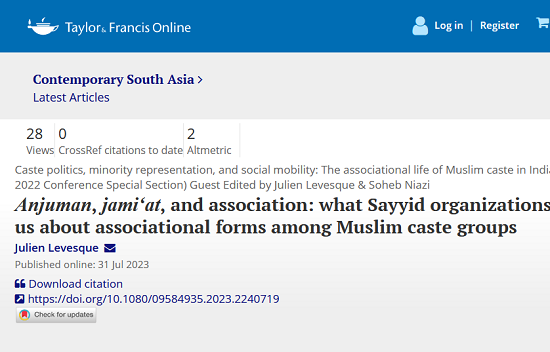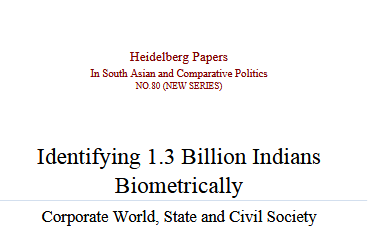Levesque, Julien. 2023. “Anjuman , jami‘at , and association: what Sayyid organizations tell us about associational forms among Muslim caste groups.” Contemporary South Asia, 1–15.

Dr. Julien Levesque, an associate researcher of CSH and currently lecturer & post-doctoral fellow at the Department of Indian Studies, Institute of Asian and Oriental Studies, University of Zürich wrote an article entitled “Anjuman, Jami‘at , and Association: What Sayyid Organizations Tell Us about Associational Forms among Muslim Caste Groups.” The article has been published in Contemporary South Asia Journal on 31 July 2023. The journal is a collection of essays jointly edited on Muslim caste association in India.
The article can be found at https://www.tandfonline.com/doi/full/10.1080/09584935.2023.2240719#B01
Abstract: In the early decades of the twentieth century in colonial India, the development of education, the expansion of electoral politics, and the decennial censuses led many caste communities, or ‘caste groups’, to organize collectively in search of internal solidarity and public assertion. Informed by the notions of service and reform, Muslims participated in this new associationism. Among them, the Sayyids – a privileged status group that claims descent from Prophet Muhammad – also formed their organizations. This article compares three Sayyid organizations in India and Pakistan, with two principal aims. First, it brings out the implicit notions of inclusion and exclusion that inform the functioning of the organizations as they seek community preservation. Second, it draws broader conclusions about associational forms available to South Asian Muslims when they act collectively on the basis of a shared social status or caste. The article concludes by delineating three ‘organizational models’ that Muslim caste groups can draw upon – the anjuman, the jami‘at, and the association. Overall, this article illustrates how Muslims frame practices of social distinction in an Islamic language of equality, piety, or service.








